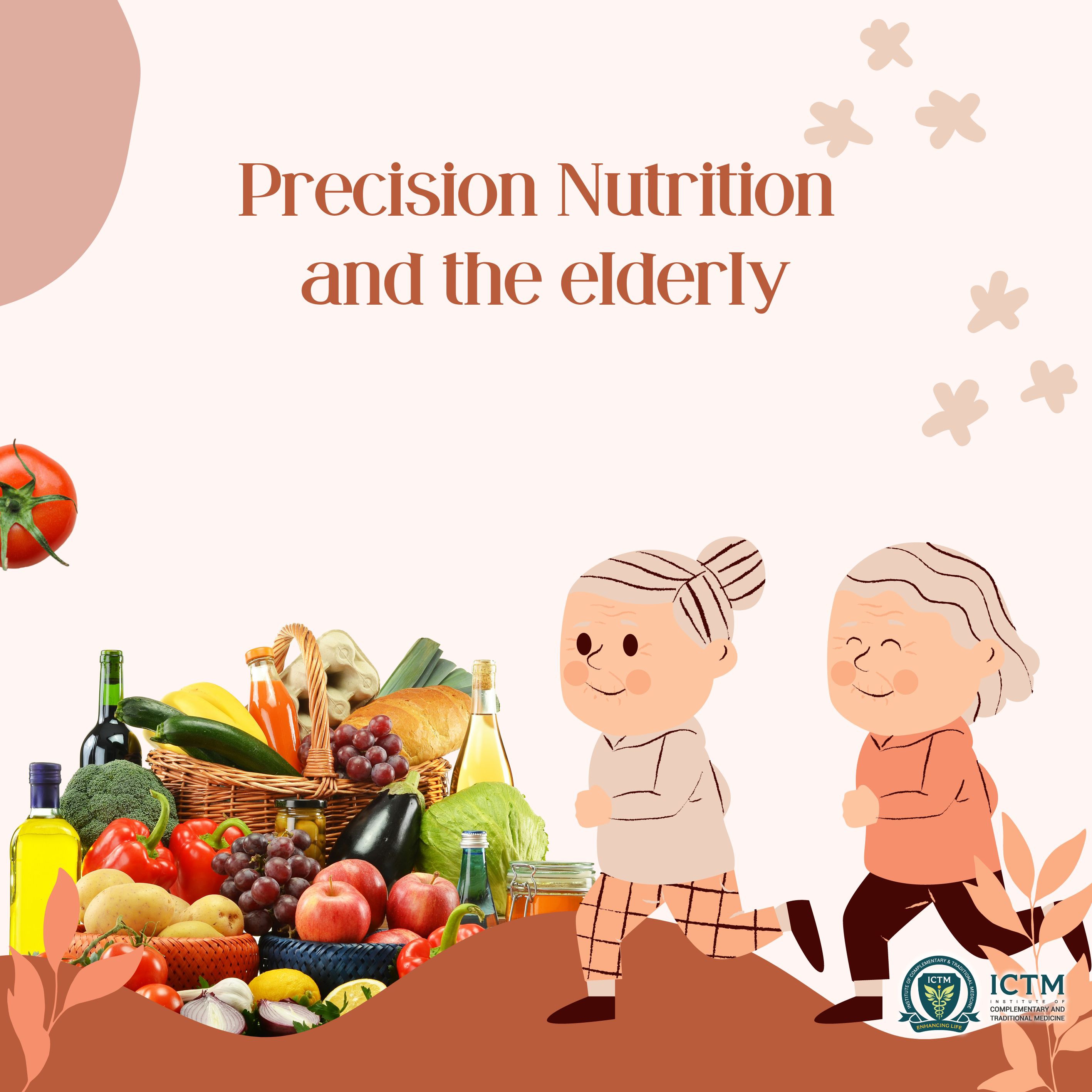Is Aromatherapy combined with Traditional Chinese Medicine a good match?
Bachelor of Nursing (First Class Honors)
Post-basic Cert

Bachelor of Nursing (First Class Honors)
Post-basic Certificate in Intensive Care Nursing
Certified HRD Trainer
Precision Nutrition and
The Elderly
Precision nutrition is also known as
personalised nutrition and is part of holistic health practices. Rather than
using a generally healthy diet guideline, the basic concept of precision
nutrition is that diet should be planned on a case-by-case basis. It is said so
because each individual has varying biochemical profiles, metabolism, genetics
and gut microbiota composition. Therefore, a general diet approach cannot be
applied to everyone. Fortunately, we have some good news, and remarkable
progress has been made over the last few decades in understanding how precision
nutrition helps with chronic diseases in the elderly.
What are the
principles of precision nutrition?
Precision nutrition
principles, generally known as “Precision Nutrition Plate”, involve the field
of nutrigenomics, microbiota, metabolomics, deep phenotyping, dietary habits,
food behaviour and physical activity. Therefore, precision nutrition is
assessed by evaluating one’s DNA, microbiome, and metabolic response to
specific foods or dietary patterns.
So, you may seem
unfamiliar terms above, let’s explain to you
Nutrigenomics: It is
the study involves the effects of nutrients on the expression of an
individual’s genetic composition
Metabolomics: The study involved
metabolites such as pigment or antibiotics that react within the body.
Deep phenotyping: It helps us to
gather about clinical manifestation in an individualized and finer-tune way.
What are common
diseases related to nutrition in the elderly?
Poor digestion
As people get older,
the properties of saliva secretion change, which may lead to a change in taste
and the food may taste bland. So, the food they used to love to eat may not
taste as delicious as before, and they will lose interest in eating. In
addition, the ageing tooth problem among the elderly may also contribute to
their reduced nutrient intake, resulting in muscle loss and body weakening.
Also, elderly with age-associated chronic disorders may experience higher
oxidative stress and disruption of their gut health. Gut dysbiosis may
ultimately contribute to indigestion, as there is a lack of gut bacteria to
process the food consumed. With so many potential root causes of indigestion
and malnourishment among older patients, it’s essential to prescribe
well-balanced diet plans for the elderly. For instance, not only can precision
nutrition advise the elderly to take appropriate amounts of macro and
micronutrients, but also the form of food in consideration, for example, liquid
nourishment, to tackle their indigestion issues more effectively.
Poor sleep
Studies showed
circadian cycle may be interrupted by metabolism and nutrition in the elderly.
Strong evidence exists for a bidirectional relationship between nutrition and
sleep disorders, including sleep fragmentation, difficulty falling asleep, and
early morning awakening. Poor sleep also influences one’s dietary choices and
meal timing. For example, gastrointestinal esophageal reflux disease (GERD) is
the most common digestive disorder in the elderly. This pathologic acid reflux
with a variety of discomfort always leads to frequent awakenings. So,
nutritional and behavioral modification is vital from the perspective of
precision medicine. The patients need to adjust their lifestyle by avoiding
fat-rich food or caffeine drinks and neuro-nutrient therapy can also help
tackle the sleep problems. For example, sufficient intake of serotonin and
Gamma-aminobutyric acid (GABA) to maintain the cascade of neuro signaling and
promote sleep duration and quality.
The Three Highs:
Hypertension, Diabetes, Hyperlipidemia
These “three highs”
are commonly seen in the elderly and affect their daily lives tremendously.
They are multifactorial and multi-genetic diseases involving genes, hormones,
gut disruption, and nutrition. Salt is a combination of sodium and chloride. This
most common flavoring in our diet is one of the diet factors that contribute to
high blood pressure. Added sugar is strongly linked to insulin insensitivity
and the development of diabetes, while saturated fat causes hyperlipidemia.
From the view of precision nutrition, what you eat and your genes interact
interchangeably, which causes metabolic syndromes to occur. In a study,
scientists tested two different carbohydrates in persons with metabolic
syndrome; one group ate a low glycemic index diet while another one ate a high
glycemic index diet. The result shows the group who eat a low glycemic index
diet can downregulate insulin signaling genes and promote insulin sensitivity.
Conclusion
Food is one of the
most important elements for a life to live well. A healthy diet can protect you
against chronic uncommunicable disease. As we know, nutritional requisites and
medical history vary for different individuals. Precision medicine, just like
its name, can accurately determine one’s nutritional status and optimize
holistic health. So, it is essential to find a certified nutritional medicine
practitioner before you want to seek professional advice. Also, if you want to
know more about elderly wellness, integrative health or complementary health,
please click here. And if you have any further enquiries, please get in
touch with us at secretary@ictm.com. The Institute of
complementary and traditional medicine team is always here and ready to help
you.